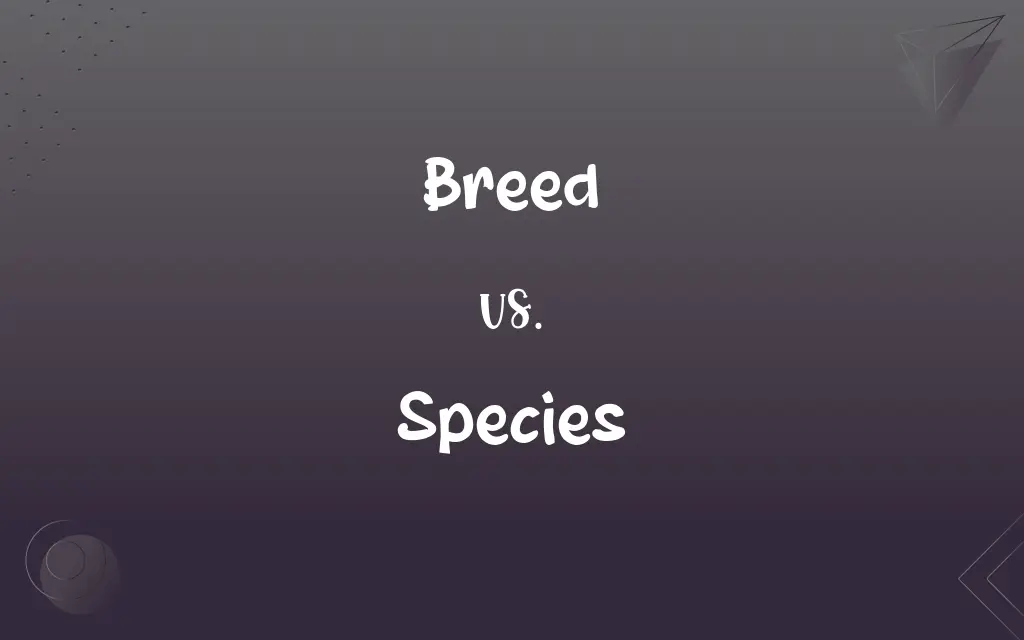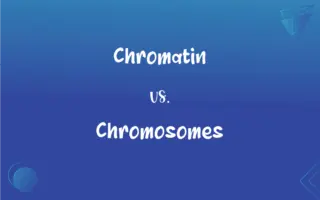Breed vs. Species: What's the Difference?
Edited by Aimie Carlson || By Harlon Moss || Updated on October 27, 2023
A breed is a specific group within a species sharing particular characteristics, while a species is a group of organisms capable of interbreeding and producing fertile offspring.

Key Differences
Breed and species are biological classifications but at different levels of specificity. A breed refers to specific groups within a species that have certain inherited features. For instance, within the species of domestic dogs, there are various breeds like Golden Retrievers, Poodles, and Beagles.
On the other hand, a species is a fundamental category in taxonomy. It denotes a group of living organisms consisting of similar individuals capable of exchanging genes or interbreeding. When talking about species, it's a broader classification. For example, the domestic dog, wolf, and fox are different species within the Canidae family.
The distinction between breed and species is vital in understanding biological diversity. While breeds often emerge due to human intervention, aiming to emphasize or diminish specific characteristics, species classification is based on natural evolutionary processes. For instance, humans have developed numerous cat breeds based on desired traits, but all belong to the same species, Felis catus.
The terminology is especially prevalent in discussions about domesticated animals. Breeds are commonly associated with pets, livestock, and other domesticated creatures. Species, however, is a universal term applied across all organisms, from bacteria to plants to animals. To put it another way, all poodles belong to the species Canis lupus familiaris, but not all members of this species are poodles.
Comparison Chart
Definition
Specific group within a species with distinct characteristics.
Group of living organisms able to interbreed and produce fertile offspring
ADVERTISEMENT
Classification Level
Sub-group within species.
Fundamental unit in taxonomy.
Origin
Often results from human intervention.
Based on natural evolutionary processes.
Example
Golden Retriever, Poodle, Beagle.
Domestic dog, wolf, fox.
Application
Commonly associated with domesticated animals.
Universal term applied across all organisms.
Breed and Species Definitions
Breed
Genetic variant of animals within the same species.
The Clydesdale is a breed of draft horse known for its strength.
ADVERTISEMENT
Species
Classification below genus in the taxonomic hierarchy.
The species name for domestic cats is Felis catus.
Breed
Animals with shared lineage and traits.
The Chihuahua breed is recognizable by its small size and alert expression.
Species
Natural population of organisms with shared characteristics.
The African elephant and Asian elephant are distinct species.
Breed
Specific subset within a species with distinctive traits.
The Labrador Retriever is a popular breed of dog known for its friendly nature.
Species
Organisms sharing structural and genetic similarities.
Humans belong to the species Homo sapiens.
Breed
Group formed by human intervention to emphasize particular characteristics.
Through selective breeding, the Siamese became a distinct cat breed.
Species
Group of organisms capable of interbreeding and producing fertile offspring.
The Bengal tiger and Siberian tiger are subspecies within the same species.
Breed
Classification of domesticated animals based on appearance or function.
The Holstein is a breed of dairy cattle producing high milk quantities.
Species
Basic unit of biological classification.
The European robin and American robin belong to different species.
Breed
To produce (offspring); give birth to or hatch.
FAQs
What is a breed?
A specific group within a species that has particular inherited characteristics.
How many species are there on Earth?
Estimates vary, but there could be over 8 million species, many yet undiscovered.
What happens when different species interbreed?
They might produce hybrids, but these are often infertile.
Can breeds exist in plants?
Yes, cultivated varieties or "cultivars" are analogous to breeds in animals.
Is breed more about genetics or appearance?
Both, as genetics influence appearance, behavior, and other breed characteristics.
Can different breeds interbreed?
Yes, different breeds within the same species can often interbreed.
How are dog breeds determined?
Dog breeds are determined based on set standards of appearance and behavior.
How does a new animal breed get official recognition?
It often requires meeting standards set by recognized kennel or breed clubs.
Are breed differences just superficial?
Mostly, but they can also encompass behavior, temperament, and some health issues.
Why is the concept of species crucial in biology?
It helps understand evolution, biodiversity, and the interrelationship of life forms.
What defines a species?
A group of living organisms that can interbreed and produce fertile offspring.
Is a species more general than a breed?
Yes, a species is a broader classification, while a breed is more specific.
What's the species name for humans?
Homo sapiens.
How are new breeds developed?
Through selective breeding for specific traits over generations.
Are species fixed in nature?
No, species can evolve over time due to various factors.
Who decides what constitutes a breed?
Breed standards are often set by breed organizations or kennel clubs.
Why is species conservation important?
To maintain biodiversity, ecosystem stability, and potential benefits for humanity.
Can different species interbreed?
Typically, different species can't interbreed, but there are exceptions.
How do scientists determine species boundaries?
Through a combination of genetic, morphological, and reproductive criteria.
Do all dogs, regardless of breed, belong to one species?
Yes, all dog breeds belong to the species Canis lupus familiaris.
About Author
Written by
Harlon MossHarlon is a seasoned quality moderator and accomplished content writer for Difference Wiki. An alumnus of the prestigious University of California, he earned his degree in Computer Science. Leveraging his academic background, Harlon brings a meticulous and informed perspective to his work, ensuring content accuracy and excellence.
Edited by
Aimie CarlsonAimie Carlson, holding a master's degree in English literature, is a fervent English language enthusiast. She lends her writing talents to Difference Wiki, a prominent website that specializes in comparisons, offering readers insightful analyses that both captivate and inform.
































































